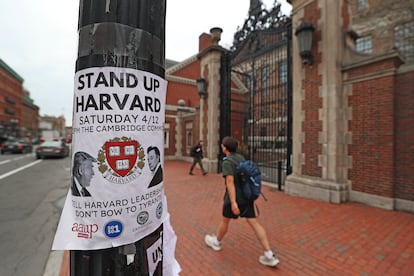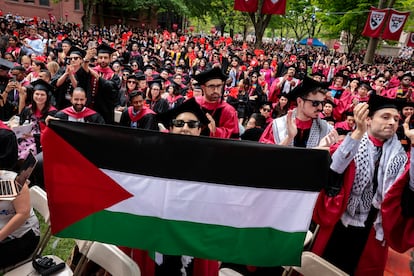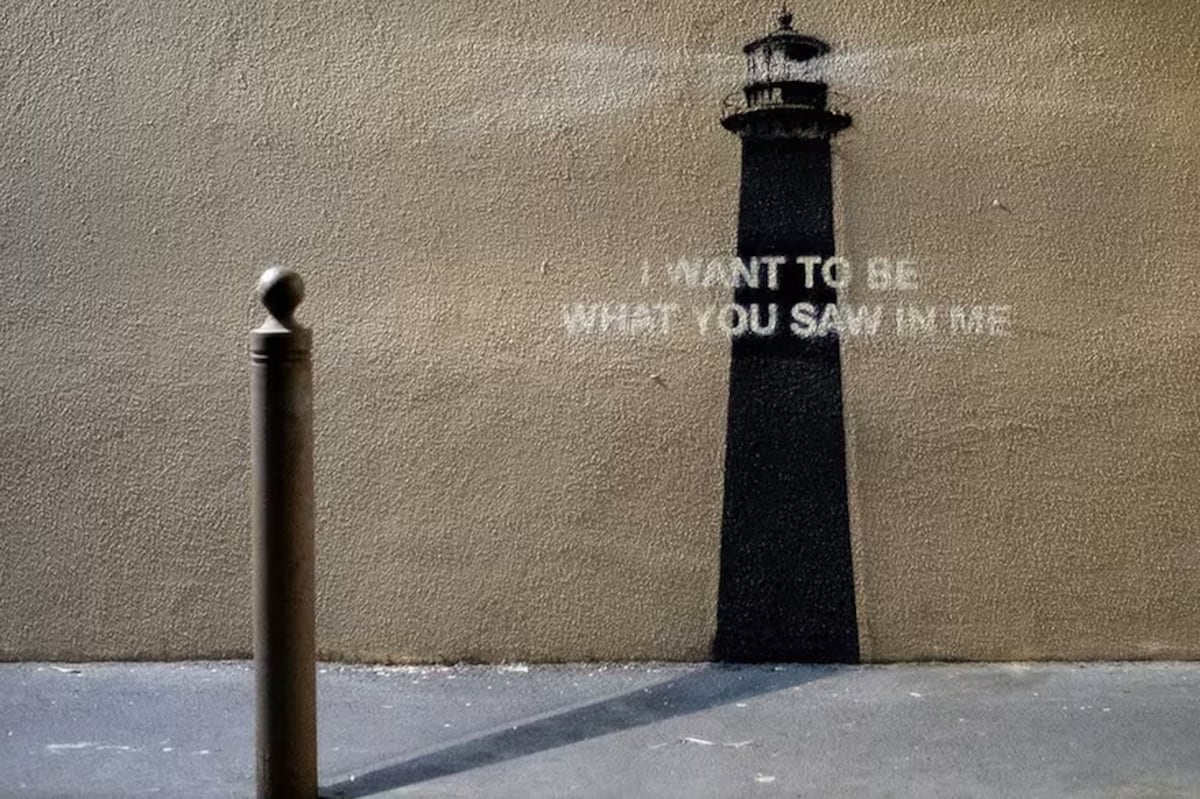[ad_1]
A federal judge in Boston on Friday blocked the Trump administration’s order revoking Harvard’s authority to admit international students. Less than a day passed between the letter in which Kristi Noem, Secretary of the U.S. Department of Homeland Security (DHS), informed the prestigious university of the termination of its student exchange program and Harvard’s lawsuit against the government. Within hours, the court confirmed a preliminary injunction against the administration’s unprecedented move.
The announcement of the lawsuit was accompanied by a letter from Harvard President Alan Garber. “We condemn this unlawful and unwarranted action,” Garber said in the letter. “It imperils the futures of thousands of students and scholars across Harvard and serves as a warning to countless others at colleges and universities throughout the country who have come to America to pursue their education and fulfill their dreams.”
The government’s attack marks an escalation in the White House’s harassment of the oldest and wealthiest higher education institution in the United States, which it accuses of fostering “antisemitism” and “terrorism” on its campus. In an effort to pressure the university, Washington officials have already frozen nearly $2.7 billion in federal funding and are threatening to revoke its tax-exempt status.

“Effective immediately, Harvard can no longer sponsor F-1 and J-1 visa holders for its upcoming summer and fall terms, despite having admitted thousands,” states Harvard’s lawsuit, which names as defendants Noem, U.S. Attorney General Pam Bondi, as well as Secretary of State Marco Rubio. “Effective immediately, countless academic programs, research laboratories, clinics, and courses supported by Harvard’s international students have been thrown into disarray. The government’s actions come just days before graduation. Without its international students, Harvard is not Harvard,” the suit continues.
In her letter, Noem ordered the suspension of the exchange program “with immediate effect.” “This means Harvard can no longer enroll foreign students and existing foreign students must transfer or lose their legal status,” clarified a DHS press release.
Pro-Palestinian protests
In recent weeks, the country’s oldest (and wealthiest) university has taken a stand against the abuses of the Trump administration. Garber has become a symbol of those who defend academic freedom above government interests and its alleged accusations of antisemitism — especially in contrast to the submissive stance taken by Columbia University.
At the heart of this latest clash is the DHS’s demand that Harvard hand over confidential information on foreign students suspected of participating in pro-Palestinian protests on campus during the past academic year.
The Secretary of Homeland Security gave the university 72 hours to provide that information, including videos or audio recordings that could serve as evidence of their involvement in “known” illegal activity; violent activity; threats to students or faculty; as their participation in protests over the past five years.

“This administration is holding Harvard accountable for fostering violence, antisemitism, and coordinating with the Chinese Communist Party on its campus,” said Noem. “It is a privilege, not a right, for universities to enroll foreign students and benefit from their higher tuition payments to help pad their multibillion-dollar endowments.”
In its lawsuit — the second Harvard has filed against the administration — university attorneys argue that the institution complied with the demands laid out by DHS on April 16, and that the move stems from Donald Trump’s personal animus toward the university (and toward higher education in general, which he sees as elitist and a promoter of so-called woke ideology). As evidence of that hostility, the complaint cites repeated attacks by the president on his social network, Truth Social.
A White House spokesperson responded Friday to Harvard’s legal action with a statement quoted by The New York Times: “If only Harvard cared this much about ending the scourge of anti-American, antisemitic, pro-terrorist agitators on their campus they wouldn’t be in this situation to begin with. Harvard should spend their time and resources on creating a safe campus environment instead of filing frivolous lawsuits” the statement said.
There are about 6,800 international students at Harvard — roughly 27% of the total student body, according to the university’s enrollment records. That number has been rising: international enrollment has increased by 19.7% since 2010. News of the exchange program suspension spread quickly among faculty, students, and researchers around the world, sparking widespread shock and uncertainty about the future.
Now, at least, many know that the university is prepared to stand up to Trump in court. President Garber addressed them at the close of his letter: “To the international students and scholars affected by yesterday’s action, know that you are vital members of our community. You are our classmates and friends, our colleagues and mentors, our partners in the work of this great institution. Because of you, we know and understand more, and our country and world are brighter and more resilient. We will support you as we do everything possible to ensure that Harvard remains open to the world,” Garber wrote.
The first courtroom confrontation between the university and the government is scheduled for July. That hearing concerns Harvard’s initial lawsuit, filed in response to a letter from a body created by the Trump Administration called the Joint Task Force to Combat Antisemitism. That letter demanded that Harvard comply with a list of requirements, including hiring an outside monitor to oversee faculty and student ideology and expelling international students deemed “hostile to American values.”
Sign up for our weekly newsletter to get more English-language news coverage from EL PAÍS USA Edition
[ad_2]
Source link






Comentarios